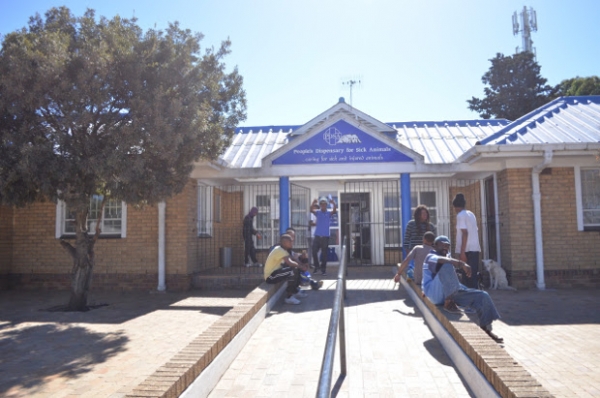Athlone’s amazing pet hospital

Walking through the People’s Dispensary for Sick Animals (PDSA) in Bridgetown, Athlone, is like walking through a hospital for humans - bare walls, corridors, operating rooms. Except, that is, for the barking and for the smell of dogs.
In the operating theatre, cats and dogs are waiting in cages. A few doors away, through the glass, a cat is visible, passed out, while the nurse performs a sterilisation operation.
A man from Bonteheuwel has brought his black and brown dog for an injection. Max, he says is one of three dogs he owns. “This is the only place that I use as a hospital for my dog. If I don’t come to this PDSA, then I go to the one in Epping. Their service is very good and they are cheap, plus this area is safe,” he says.
On a Wednesday morning, the waiting room is packed with pet owners. The clinic treats roughly about 100 pets a day, Monday to Saturday, and is also open for emergencies on Sundays.
The PDSA, which was founded in the United Kingdom in 1937, has been operating in South Africa since 1987 and employs 88 people nationally.
CEO Patrick Horrigan says services are aimed at pet owners who cannot afford private vets. Apart from the Bridgetown hospital, there are clinics in Mitchell’s Plain and Athlone.
“We are a non-profit organisation, meaning we do not get any sort of funding from government,” says Horrigan. “We do charge fees for our services. Most animal welfare organisations, in fact all animal welfare organisations, have been forced into charging something.”
The most common ailment, he says, is gastro, but the PDSA treats a wide range of illnesses and complaints including trauma where an animal is knocked over by a car, a paw is slammed in a door or a dog is injured in a fight. Vaccinations are offered. Sterilisation is a big issue for animal welfare organisations and the PDSA works hard to encourage people to get their pets sterilised, says Horrigan.
The standard fee for vaccination or treatment is R70.
The organisation does not get involved in issues of cruelty to animals, adoptions or shelter for stray dogs.
Several years ago this cat (Scurvy) broke her leg after falling three floors. The Bridgetown PDSA inserted a titanium implant into her leg, allowing her to use her leg again.
Breeders are not encouraged because, says Horrigan, they make money from their animals and should not be using a service for the needy.
The PDSA caters mostly for cats and dogs, but does get the odd rabbit and bird.
Horrigan says there are many ways people can get involved in the PDSA. Members get regular newsletters and are kept informed of the organisation’s activities.
Volunteers are not encouraged. “We don’t use a lot of volunteers in that we don’t want to use untrained people. In fact the South African Veterinary Council, does not allow it. For example, we cannot have kids here for the holidays to help with the dogs and cats. They would only be able to help, maybe, in cleaning out the cages,” he says.
“But we do a little bit of job shadowing from time to time.”
See the PDSA website for details on how to donate.
Next: Rhodes falls
Previous: Louis Botha statue defaced

This article is licensed under a Creative Commons Attribution-NoDerivatives 4.0 International License.


